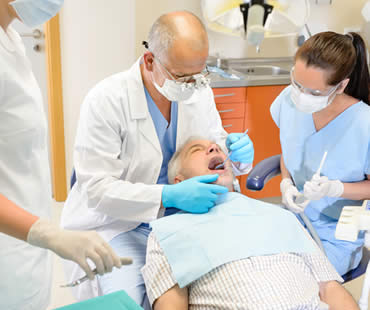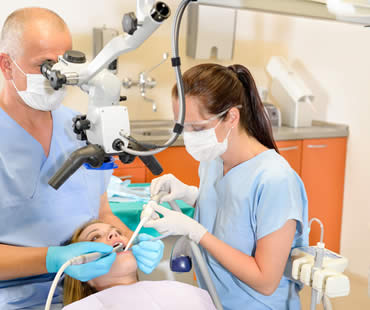
Some people would rather endure tooth pain than have their wisdom teeth extracted during surgery. Most of the time, fears are based on irrational tales that people read on the internet or hear from others. The truth is that wisdom tooth surgery is extremely common and most oral surgeons perform them every day without complications. The best way to overcome fear is to learn more about the procedure and recovery.
Procedure:
Extracting wisdom teeth involves opening the gums above the tooth and removing any bone that is blocking the tooth’s ability to erupt. The tissue will be separated to be able to remove the tooth, sometimes even in pieces if necessary. In some cases when bone is removed, a bone graft is needed to replace it. After the procedure is complete, stitches will be placed that will dissolve with time. If this sounds awful, remember that patients don’t feel any pain during the procedure due to sedation and usually don’t even recall anything that happened during treatment.
Recovery:
There are some common outcomes to be expected after wisdom tooth extraction, all of which usually subside within a few days as long as you follow your surgeon’s instructions. Have someone accompany you to and from the appointment so they hear the recovery directions and so you don’t drive. Afterwards, you will be given gauze to bite on at the extraction site. Bite gently on the gauze and change it frequently. Avoid lying flat on your back because bleeding may increase. If you experience swelling, hold ice packs on the outside of your cheeks for the first day. Eat soft foods and avoid using a straw for the first few days, and try not to touch the area with your fingers or tongue. Do not smoke for at least 24 hours after oral surgery. If you follow all these guidelines and any others that your doctor provides, there are few risks and no reason to be afraid of wisdom tooth extraction.
If you live in the Toronto area contact us today

A wisdom tooth is often extracted to correct an existing dental problem or to prevent the possibility of problems that may arise in the future. Some problems associated with wisdom teeth are:
- Your jaw may be too small to accommodate the eruption of your wisdom teeth, leading them to become impacted (stuck in the jaw, often under the edge of an adjacent tooth) and unable to erupt through your gums.
- Your wisdom teeth may partially erupt, leaving a flap of soft gum tissue to grow over the tooth. Food, bacteria and germs can get trapped underneath this gum flap, leading to swelling, redness and pain, which are signs of infection.
- Impacted teeth can lead to a more serious problem, such as acute infection, damage to the surrounding teeth, damage to the bone or the development of a cyst.
- Wisdom teeth can present at an awkward angle, coming in with the top of the tooth facing sideways, forward or backward.
Removing your wisdom teeth can be a good method to prevent:
- crowding at the back of the mouth
- an impacted wisdom tooth stuck in the jaw and never erupting
- painful gums or infection caused by a flap of gum skin
- gum disease or tooth decay in the individual wisdom tooth or in the surrounding teeth and gums
You may want to have your wisdom teeth removed when you are younger because:
- The younger you are, the less developed your wisdom teeth roots are, and the less dense your jawbone, allowing for an easier extraction of the tooth.
- The majority of problems with wisdom teeth begin between the ages of fifteen and twenty-five.
- If you have a medical condition that is known to worsen with time, you may choose to have your wisdom teeth out early, while you are in your best health, to facilitate maximum healing.
Wisdom teeth extraction is rarely harmful, but there are risks associated with any surgery. Talk to your dentist today about any concerns you have regarding wisdom tooth extraction.
If you live in the Toronto area contact us today

Evolution has rendered wisdom teeth useless, and a high percentage of these unnecessary molars eventually require removal. When a wisdom tooth, otherwise known as a third molar, cannot erupt into proper alignment, it is called impacted. Oral surgery to extract impacted wisdom teeth may be considered if you have the following problems:
- Mouth pain and bite problems caused by damage to surrounding teeth created from crowding caused by the extra molars.
- Jaw and nerve damage caused by cysts that form around the impacted wisdom teeth.
- Sinus pain, pressure and congestion resulting from problems with wisdom teeth.
- Inflamed and infected gum tissue created because the area around impacted wisdom teeth is difficult to clean properly.
- Cavities which develop due to infected gums that allow pockets to form between gums, allowing bacteria to grow.
- Alignment issues that alter the effects of braces, bridges, crowns and partial dentures due the crowding created by impacted wisdom teeth.
To diagnose impacted wisdom teeth, your dental professional will look for signs of infection or swollen gums. Your dentist will also inquire about your regular oral hygiene habits. The diagnosis of impacted wisdom teeth can be confirmed with dental x-rays, which may also reveal damage to the other teeth or jawbone.
When making a decision with your dentist about wisdom tooth extraction, it’s important to consider your age. Typically third molars erupt between the ages of 16 and 25 years. Younger patients experience considerably fewer complications with oral surgery for wisdom tooth extraction than older adults.
If your dental professional recommends removal due to the diagnosis of an impacted wisdom tooth, ask for a referral to a qualified oral and maxillofacial surgeon to ensure a successful and complication-free oral surgery.
If you need a dentist in Toronto contact us today

Chewing and swallowing can be tricky after wisdom tooth extraction. Gauze pads and a sore mouth can make eating sound unappealing, but it is vital to your healing to maintain a healthy diet. When you have a tooth extracted, a clot forms to help with healing. It’s important not to disrupt the clot, which means it is crucial to maintain a soft-food diet. In addition, spicy, acidic or hard-to-chew foods can cause additional discomfort and prevent healing.
For the first one or two weeks after your wisdom tooth extraction, plan to stick to a diet of soft, easy-to-chew foods. This guideline does not mean you are stuck eating Jello for your entire recovery period. Some suggestions for healthy foods that would be appropriate after wisdom tooth extraction include:
- Mashed potatoes
- Milkshakes
- Cottage cheese
- Macaroni and cheese
Be careful never to use a straw during recovery, as the suction can remove the clots in your gums and create problems with healing. Some of these foods may still be too chewy, so you will need to gauge if they need to be cooked longer or further softened to make them easier to ingest. Pasta or macaroni can be overcooked to make it easier to chew, and soups can be blended to eliminate chunks of vegetables or meat. Be sure to follow the aftercare and eating recommendations of your oral surgeon, and don’t push yourself to return to normal foods until your mouth feels ready.
We treat patients from Toronto and the surrounding area

Wisdom teeth are the third set of molars and the last adult teeth to erupt into the mouth. Most people have four wisdom teeth, two on the bottom and two on top. Many people do not have enough room for these molars to emerge completely, causing them to become impacted in the gum. Impacted wisdom teeth are difficult to clean, making them more susceptible to decay and disease. Other dental problems caused by impacted wisdom teeth include pain, damage to surrounding teeth, and bite alignment issues. For these reasons, your dentist may recommend having the impacted teeth removed to prevent future problems.
Surgery to extract an impacted wisdom tooth or set of wisdom teeth is usually an outpatient procedure done in your dentist or oral surgeon’s office. If the tooth or surrounding area are deemed to have an infection prior to the procedure, surgery will be delayed, and your dental professional will likely prescribe antibiotics to help heal the area.
On the day of surgery, local anesthesia will be administered to numb the area where the extracted tooth will be removed. Depending on the severity of your case, your dentist or oral surgeon may also utilize a general anesthetic.
Once the anesthesia has taken effect, an incision will be made to open up the gum and any bone blocking the tooth will be removed. Your dentist or surgeon will then separate the tissue connecting the bone to the tooth and extract the tooth. Some teeth are too large to remove in one piece, in which case your surgeon will cut the tooth into smaller pieces to make it easier to remove. Finally, the incision is closed with stitches and packed with gauze to help alleviate bleeding.
Long-term complications from impacted wisdom tooth surgery are rare. To ensure a successful recovery from this or any oral surgery, be sure to follow all aftercare instructions provided by your dentist or oral surgeon.
Our dental office is located in Toronto

Most dental professionals recommend having third molars, or wisdom teeth, removed in early adulthood, preferably before they are fully formed and rooted into the jaw. Generally, this means having wisdom teeth extracted between the ages of 17 and 25. Waiting until you are older to have wisdom teeth removed can have considerable risks and complications.
Wisdom teeth that are not removed create the following risks:
- Impaction caused by wisdom teeth that do not have sufficient room to grow, causing pain and potential disease and damage to adjacent teeth.
- Tooth decay from wisdom teeth that are difficult to keep clean.
- Infection caused by bacteria that is harbored in the wisdom tooth eruption site.
- Growth of tumors and cysts caused by severely impacted wisdom teeth.
For patients who need to have wisdom teeth removed later in life, complications can include:
- More complicated removal surgery to eliminate deeply rooted or impacted wisdom teeth that results in longer surgery recovery time.
- Roots that have grown close to the nerve that affects the feeling in the lower lip might be injured in surgery, causing permanent nerve damage.
If you or your young adult have emerging wisdom teeth, schedule a consultation with your dentist to determine if and when they should be removed. While some patients will not need to have their third molars extracted, in most cases, having wisdom teeth removed as they are erupting can help to avoid a host of future problems. When wisdom tooth extraction is performed early, recovery time and risk of complications are drastically reduced for most patients.
We treat patients from Toronto and the surrounding area







 E-Mail Us
E-Mail Us  416-595-5490
416-595-5490








